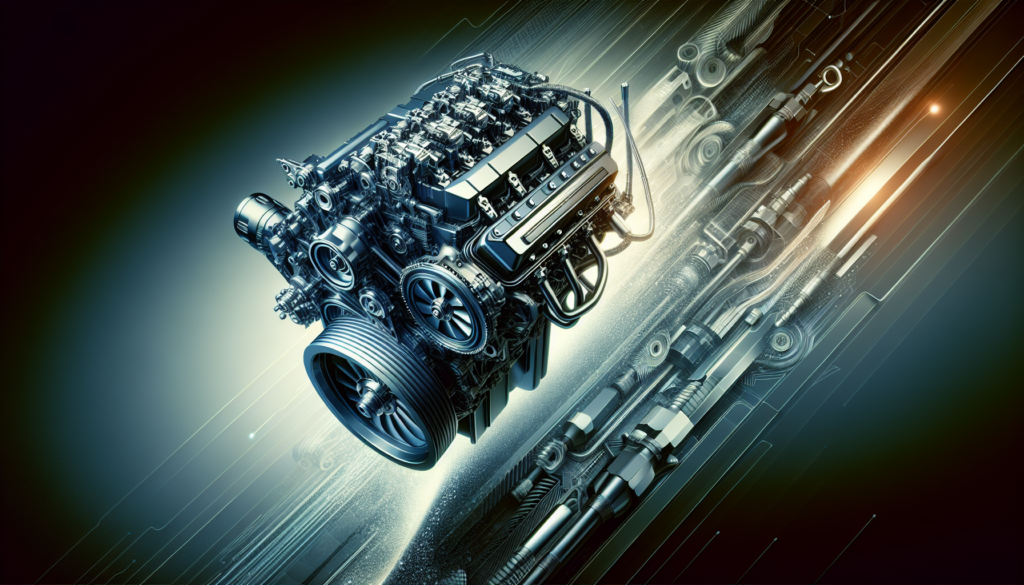Are you a boat enthusiast looking for ways to enhance the performance of your beloved vessel? Look no further! This comprehensive guide is here to provide you with all the information you need for boat engine upgrades. From choosing the right engine to understanding the different types of upgrades available, we’ve got you covered. Whether you’re a seasoned boater or just starting out, this ultimate guide will help you make informed decisions to maximize the power, efficiency, and overall enjoyment of your boat. So, let’s embark on this exciting journey together and discover the world of boat engine upgrades!

Types of Boat Engines
Outboard Engines
Outboard engines are one of the most common types of boat engines found in the market. These engines are mounted on the transom of the boat, making them easily accessible for maintenance and repairs. Outboard engines are known for their portability and versatility, as they can be easily removed and used on different boats. They are available in a wide range of sizes and power options, making them suitable for various boating applications.
Inboard Engines
Unlike outboard engines, inboard engines are installed inside the hull of the boat. They are known for their reliability and performance, making them a popular choice for larger vessels. Inboard engines provide better weight distribution, resulting in enhanced stability and maneuverability. These engines are generally more fuel-efficient and quieter compared to outboard engines. However, they require a more complex installation process and are less accessible for maintenance.
Stern Drive Engines
Stern drive engines, also known as inboard/outboard (I/O) engines, combine the features of both outboard and inboard engines. They are mounted inside the hull like inboard engines but have a drive unit that extends outside the transom, resembling the appearance and functionality of an outboard engine. Stern drive engines offer the advantages of better weight distribution, improved fuel efficiency, and easy maneuverability. They are commonly found in recreational boats and provide a good balance between power and accessibility.
Jet Engines
Jet engines, also known as water jet propulsion systems, use a jet of water to create propulsion. This type of engine is commonly found in personal watercraft, jet boats, and some larger vessels. Jet engines offer several benefits, including shallow water operation, increased maneuverability, and reduced risk of damage from underwater obstructions. However, jet engines are generally less fuel-efficient compared to other engine types and may require a larger upfront investment.
Considerations for Upgrading Boat Engines
Engine Size and Power
When upgrading your boat engine, it is crucial to consider the desired size and power of the new engine. The recommended engine size and power will depend on the type of boat, its intended use, and the load it will carry. It is essential to choose an engine that provides sufficient power to meet your boating needs while ensuring optimal performance and fuel efficiency.
Fuel Efficiency
Fuel efficiency is an important factor to consider when upgrading your boat engine. A more fuel-efficient engine can significantly reduce your operating costs, especially if you spend a significant amount of time on the water. Look for engines with advanced fuel injection systems, optimized combustion processes, and innovative technologies that promote better fuel economy.
Cost
The cost of upgrading your boat engine is another crucial consideration. Engine upgrades can vary greatly in price, depending on factors such as engine type, size, power, and additional features. It is essential to set a budget and consider the long-term cost savings that a more efficient engine may provide. Remember to factor in installation costs and any necessary modifications that may be required.
Compatibility
When upgrading your boat engine, compatibility with your existing boat systems is vital. Consider the compatibility of the new engine with your boat’s fuel system, electrical system, controls, and other components. Upgrading to an incompatible engine may require additional modifications or replacements, increasing the overall cost of the upgrade.
Maintenance and Serviceability
Consider the ease of maintenance and serviceability of the new engine. Look for engines that offer easy access to critical components for routine maintenance and repairs. Engines with readily available spare parts and a reliable service network can save you time and money in the long run.

Choosing the Right Engine Upgrade
Identifying Your Needs
Before choosing an engine upgrade, it is essential to identify your specific boating needs. Consider factors such as the type of water you will be boating in, the distance you will be covering, the load you will be carrying, and the speed you desire. Identifying your needs will help you determine the appropriate engine size, power, and features that will best meet your requirements.
Consulting with Experts
Seek the advice of marine experts or boat mechanics when considering an engine upgrade. These professionals have the experience and knowledge to guide you in selecting the right engine for your boat. They can help assess compatibility, recommend suitable options, and provide valuable insights based on your specific boating needs.
Researching Options
Take the time to research different engine brands, models, and technologies. Consider factors such as reliability, performance, fuel efficiency, and customer reviews. Look for engines that have a proven track record and a good reputation in the boating community. Online forums and boating magazines can be valuable sources of information and user experiences.
Budgeting for the Upgrade
Set a realistic budget for your engine upgrade and consider the long-term cost savings. Take into account not only the cost of the engine itself but also installation costs, modifications, and any additional accessories or components that may be required. A well-planned budget will help guide your decision-making process and ensure you get the best value for your investment.
Engine Power and Performance Upgrades
Adding Superchargers or Turbochargers
Superchargers and turbochargers are popular upgrades for increasing engine power and performance. These devices compress air entering the engine, delivering a higher oxygen concentration for combustion. This process results in increased horsepower and torque output, allowing your boat to achieve higher speeds and improved acceleration.
Upgrading Engine Components
Upgrading engine components, such as the camshaft, cylinder heads, and exhaust system, can have a significant impact on performance. High-performance components are designed to optimize airflow, combustion, and exhaust flow, resulting in enhanced power and efficiency. Consult with experts or engine builders to determine the best combination of components for your specific needs.
Fuel Injection System Upgrade
Upgrading to a modern fuel injection system can provide several benefits, including improved fuel efficiency and better engine performance. Electronic fuel injection systems deliver precise fuel metering, optimizing combustion and reducing fuel wastage. Consider upgrading to a fuel injection system that is compatible with your engine and offers advanced features like multi-point injection or direct injection.

Fuel Efficiency and Emission Control Upgrades
Introducing Electronic Fuel Injection
As mentioned earlier, upgrading to an electronic fuel injection system can significantly improve fuel efficiency. These systems precisely meter fuel, delivering the optimal air-to-fuel ratio for combustion. Electronic fuel injection also promotes cleaner combustion, reducing harmful emissions and minimizing environmental impact.
Installing Catalytic Converters
Installing catalytic converters can further enhance emission control and environmental sustainability. Catalytic converters reduce the levels of harmful pollutants in engine exhaust gases, such as carbon monoxide, nitrogen oxides, and hydrocarbons. Upgrading to a catalytic converter can help reduce your boat’s carbon footprint and ensure compliance with environmental regulations.
Upgrading Exhaust Systems
Upgrading your boat’s exhaust system can improve performance, reduce noise levels, and enhance fuel efficiency. Upgraded exhaust systems are designed to optimize gas flow, minimize backpressure, and reduce exhaust restrictions. Choose exhaust components that are specifically designed for your engine and boat size to maximize the benefits of the upgrade.
Electronics and Control System Upgrades
Upgrading Engine Control Units (ECUs)
Engine Control Units (ECUs) play a crucial role in optimizing engine performance and fuel efficiency. Consider upgrading to a more advanced ECU that offers features like real-time tuning, data logging, and customizable performance settings. Upgraded ECUs can provide better engine management and allow for fine-tuning to match your specific boating requirements.
Installing Digital Gauges and Displays
Digital gauges and displays can provide accurate and real-time information about your engine’s performance. Upgrading to digital gauges offers advantages such as improved readability, customizable layouts, and additional data options. Choose gauges that are compatible with your upgraded engine and offer the information you need to monitor and optimize performance.
Enhancing Connectivity
Boat engine upgrades can also include enhancing connectivity options. Consider upgrading your engine to integrate with navigation systems, chartplotters, or mobile apps. Connectivity features can provide valuable information about fuel consumption, engine diagnostics, and maintenance schedules. These upgrades can enhance your boating experience and make monitoring and controlling your engine more convenient.

Lower Unit and Propeller Upgrades
Upgrading the Lower Unit
Upgrading the lower unit of your boat’s engine can improve performance and efficiency. Consider replacing the standard lower unit with a high-performance aftermarket unit. Upgraded lower units offer features like larger gears, enhanced cooling systems, and improved hydrodynamics. These upgrades can result in smoother operation, reduced fuel consumption, and enhanced maneuverability.
Choosing the Right Propeller
The propeller plays a crucial role in determining a boat’s speed, acceleration, and fuel efficiency. Upgrading to a high-quality propeller that is suited to your engine and boat type can provide significant performance improvements. Consider factors such as pitch, diameter, and material when choosing the right propeller for your upgraded engine.
Optimizing Pitch and Diameter
Optimizing the pitch and diameter of your boat’s propeller can help fine-tune performance. Higher pitch propellers typically offer better top-end speed, while lower pitch propellers provide improved acceleration and handling. The diameter of the propeller also affects performance, with larger diameters offering increased thrust and better fuel efficiency. Consult with experts or propeller specialists to determine the optimal pitch and diameter for your specific boating needs.
Maintenance and Serviceability Upgrades
Improving Accessibility for Maintenance
Upgrading your boat’s engine to improve accessibility for maintenance can save you time and effort in the long run. Consider modifications or additions that make routine maintenance tasks, such as oil changes and filter replacements, more accessible. This can include adding access hatches, improving engine compartment design, or installing quick-disconnect systems for components.
Using Corrosion Protection Coatings
Protecting your engine against corrosion is essential for maintaining its performance and longevity. Consider applying corrosion protection coatings to critical engine components. These coatings act as a barrier against saltwater corrosion and can significantly extend the lifespan of your engine. Regularly check and reapply these coatings as necessary to ensure continued protection.
Investing in Spare Parts
Investing in spare parts is a smart move when upgrading your boat engine. Having a stock of commonly needed spare parts can help minimize downtime and ensure prompt repairs in case of any issues. Stock up on spare filters, spark plugs, belts, and other critical components. Consult with experts or your engine manufacturer to determine the recommended spare parts to keep on hand.

Enhancing Comfort and Convenience
Adding Sound-Deadening Insulation
Boat engines can generate significant noise levels, impacting comfort and enjoyment on the water. Consider adding sound-deadening insulation to your engine compartment to reduce noise and vibration. This insulation helps create a quieter boating experience, making conversations easier, and reducing fatigue during long trips.
Installing Remote Control Systems
Upgrading to a remote control system can enhance convenience and ease of use. Remote control systems allow you to operate your engine from a distance, providing flexibility and control. This upgrade can be particularly beneficial for boats with multiple engines or for those who prefer operating their boat from different positions.
Improving Ergonomics
Consider upgrading your engine controls and instrumentation to improve ergonomics. Upgraded controls should be easy to reach and operate, allowing for precise control and reducing strain on the operator. Ergonomic improvements can help reduce fatigue, improve safety, and enhance the overall boating experience.
Step-by-Step Installation Guide
Preparing the Boat
Before installing the new engine, it is essential to prepare your boat. This includes removing any equipment or components that may hinder the installation process and ensuring the boat is clean and free from obstructions. Follow the manufacturer’s guidelines for preparing the boat and check for any specific requirements or recommendations.
Removing the Old Engine
Carefully remove the old engine, disconnecting all electrical, fuel, and control connections. Take note of the connection points and labeling to ensure a smooth installation of the new engine. Properly dispose of the old engine according to local regulations.
Installing the New Engine
Follow the manufacturer’s instructions and recommendations for installing the new engine. Ensure all connections are properly made, and all components are secured according to the manufacturer’s specifications. It is important to double-check the compatibility and fit of the new engine with your boat’s systems, making any necessary adjustments or modifications as required.
Testing and Fine-tuning
Once the new engine is installed, perform a thorough testing process to ensure everything is functioning correctly. Start by checking for any leaks, abnormal sounds, or vibrations. Verify the accuracy of gauges and displays, and check that all controls operate smoothly. Fine-tune the engine’s performance and settings, if necessary, to optimize its operation and ensure a seamless boating experience.
By considering the various types of boat engines, the factors to consider when upgrading, and the specific upgrades available, you can make an informed decision that suits your boating needs and preferences. With proper planning, research, and consultation, upgrading your boat engine can greatly enhance your boating experience and enjoyment on the water.


[…] So, you’ve got that boat of yours and you’re ready to take it to the next level. Well, lucky for you, we’ve put together a list of the top 5 performance modifications for boat engines that will have your vessel running smoother, faster, and more efficiently than ever before. Whether you’re a seasoned sailor or a novice navigator, these modifications are guaranteed to enhance your boating experience and have you cruising the open waters with style and power. So, tighten your life jacket, hold on tight, and let’s dive into the world of boat engine upgrades! […]